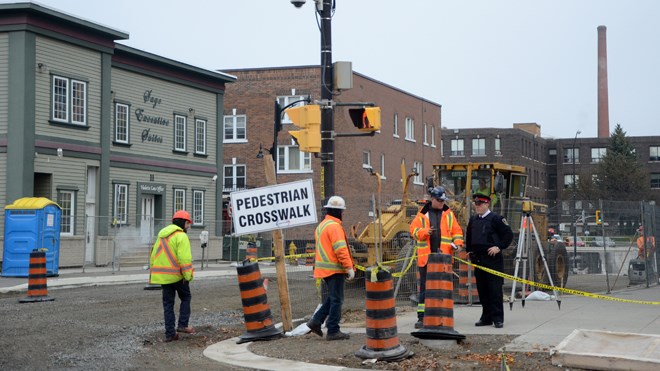SUDBURY — Greater Sudbury was within its right when it barred Interpaving from bidding on city contracts, says a decision handed down by appeals judges in Ontario's Superior Court of Justice.
Two of the three judges hearing the case supported the ban, while one issued a dissenting option.
The decision, released in late June, centred on the city's ban on the Interpaving imposed in March 2016 for four years, in the wake of a fatality in September 2015 at an Elgin Street job site.
In March of this year, Interpaving was fined $195,000 under the Occupational Health and Safety Act in connection with the fatality. The company was found guilty of failing to provide a signaller at a 2015 construction project that resulted in the death of a Sudbury woman. The city is also facing charges, and a decision in that case is expected Aug. 31.
Interpaving took the city to court over the disqualification two years ago, arguing that the bylaw used to ban them was invalid, that the ban was imposed in bad faith, and denied the company had a history of “abusive behaviour” directed toward city staff. Before the ban, the company had successfully bid on city contracts worth an average of $19 million year.
The court ruling gave insight into some of the issues the city has had with Interpaving over the years.
“The city referred by way of example to an incident on Aug. 29, 2012, in which Mr. Argento, a director and shareholder of Interpaving, threatened to run over a city inspector who had ordered a suspension of work due to issues regarding concrete testing and pouring on the site,” the court transcript says. “The debarment letter also stated that the city had met with Interpaving representatives on numerous occasions to put a stop to such behaviour, without success.”
Another issue was the company suing the city over what's known as 'change orders' – basically extra work required on a job site that was not part of the original contract. The city contended that Interpaving “routinely abused” that process, “including the assertion of frivolous claims and the failure to assert claims in a timely manner.”
That includes a $233,500 lawsuit launched in 2014 against the city by Interpaving that's still in front of the courts. The city's purchasing bylaw includes language that bars companies that frequently sue the city from bidding on contracts.
The city also had problems getting Interpaving to accept its obligations under the Ontario Health and Safety Act, the transcripts say.
After the company was barred in March 2016, Interpaving officials met with city staff in the following weeks, where they were offered the chance to formally request reconsideration of the decision. The company submitted a letter after a second meeting, which the city took as an official request to reverse the decision. The request was denied.
While Interpaving argued the purchasing bylaw was invalid because there was no appeal mechanism, the court ruled the city gave the company a chance to present its case in those meetings.
Interpaving also claimed the bylaw violated free trade agreements, and the company's right to sue a municipality.
“We do not agree,” the judges wrote. “There is no evidence that either the bylaw or the debarment decision contravenes Canada's free trade agreements. Moreover, as noted in (a previous court ruling), 'a municipality has essentially the same right as a business person to decide with whom it will do business.'"
In determining whether the decision by the city was reasonable, the court ruled the history between the company and the city showed the decision to ban them was the result of years of problems, rather than a reaction to the 2015 tragedy. That history includes the lawsuits, abusive behaviour and abuse of the change order mechanism.
“Viewed collectively, these matters amply support the debarment decision,” the transcript says. “Further, given the time required to resolve the outstanding issues between the parties in order to permit a fresh start in the relationship, a debarment period of four years is also reasonable in our view.”
Interpaving was also ordered to pay the city court costs of $40,000 within 60 days.
However, one of the three justices issued a dissenting opinion. The city should have provided all the documents it had backing up the decision to Interpaving as part of the process, the judge wrote, and it should have provided a formal appeals process, rather than the informal meetings that took place at the request of the company.
And the appeal should have been heard by someone other than the city staff who made the decision to bar Interpaving.
— Sudbury.com
